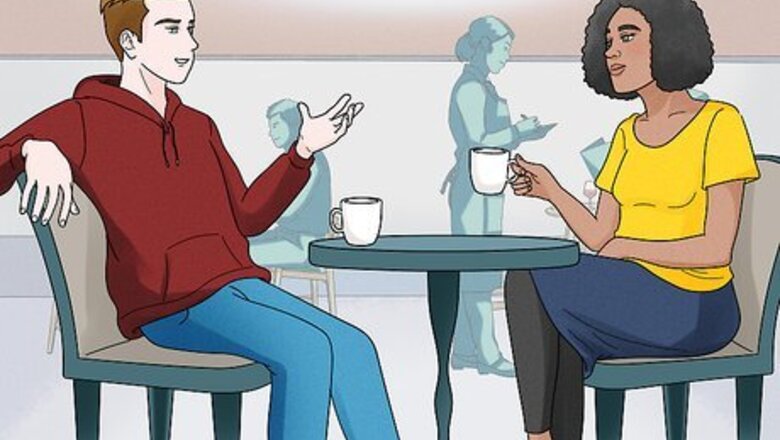
views
Interact one-on-one.

Spend individual time with an introverted person instead of in large groups. If you're really hoping to have a meaningful conversation with someone who's introverted, choose a quiet, personal setting instead of a crowded space with a big group of people. This puts the other person at ease so it's easier for them to talk. For example, if you're dating an introverted person, they'd probably prefer eating at a quiet restaurant and checking out a small music scene rather than going to a crowded, noisy concert with a lot of people.
Encourage the introverted person to talk.
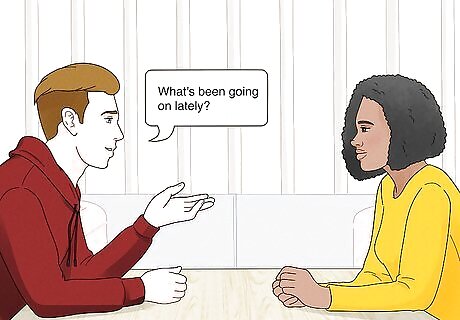
Ask the introverted person to open up and share their thoughts. Introverted people aren't usually the first to respond in a conversation, and in a relationship they might seem quiet. Check-in with the introverted person by asking how they're doing or how they're feeling. Ask open-ended questions to give them an opportunity to talk. For example, instead of asking, "Are you okay?" ask, "What's your day been like?" or, "What's been going on lately?"
Give an introvert time to respond.
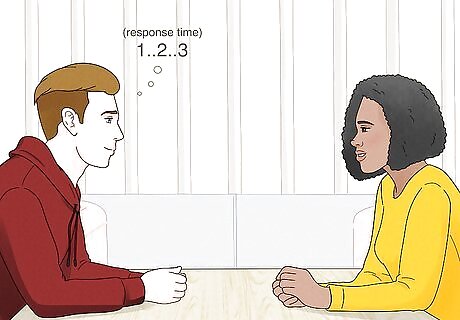
Leave space after questions or comments so introverts feel comfortable. Most introverted people won't rush to respond or jump into a conversation, especially if there's a lot of discussion. This is true for co-workers, kids, or romantic partners. Make room in the conversation so they can reflect and respond without feeling pressured. For example, instead of asking a question and immediately calling on someone, slowly count to 3 in your head to make space for a response.
Don't be afraid of silence in the conversation.
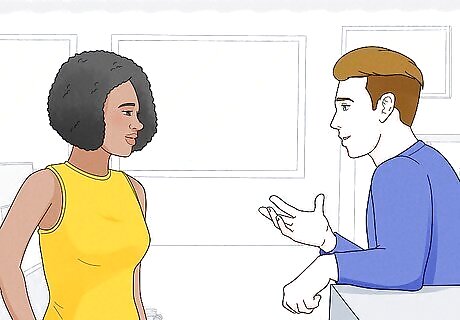
Introverts don't mind silence or deeper conversations. Extroverted people might feel like they have to make idle chit-chat to fill a lull in the conversation, but small talk can actually make introverted people feel anxious. Instead of talking, don't be afraid to let the silence linger, or engage in a more meaningful conversation. If you're at a party and want to put an introverted person at ease, try to find someone they know for them to talk to rather than expecting them to join in a large conversation with strangers.
Improve your listening skills.
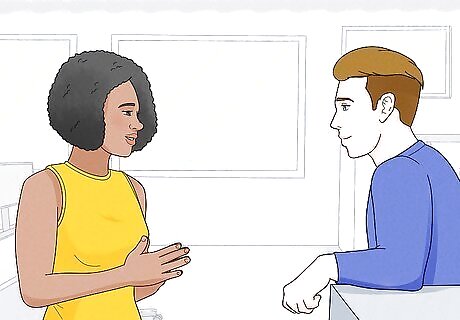
Pay attention so you're doing more listening than talking. If you're extroverted, you might feel totally comfortable talking, especially if the introverted person isn't saying much. However, if you really focus on listening to the other person, they might be more inclined to open up. One way to show them that you're listening is to mirror what they've said to you. For example, say something like, "It sounds like you had a really crummy day. Tell me more about it."
Communicate more with texts and emails.
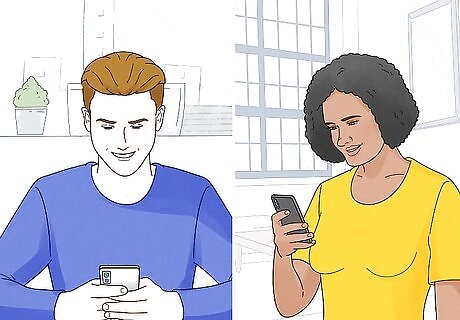
Write to introverts instead of expecting phone calls or in-person chats. Many introverted people feel anxiety when they have to have to make a phone call or meet up with someone. To put them more at ease, send a text or email instead. You might find that this opens up a better line of communication. If you're working with an introverted person, try to minimize the number of interactions you have to reduce stress. For example, instead of popping in to ask them questions whenever you have them, consolidate your thoughts and send them in a single email.
Acknowledge their strengths and accomplishments.

Make an introverted person feel appreciated and valued. While introverted people don't like a lot of attention, most enjoy feeling appreciated, especially by close friends. Make a point of praising them or thanking them for good things they've done. For example, pull aside an introverted colleague and tell them what a great job they did on a recent project or let an introverted partner know that you appreciate them.
Create space for the introverted person to feel comfortable.

Give them physical or mental space to relax. This might mean that your introverted child has a quiet space in their room or classroom, or you give a partner or co-worker some time on their own. Space for quiet reflection can de-stress an introverted person. If you and your introverted partner have spent all day together, they may want some time on their own in the evening. This is totally okay and it can make them feel recharged.
Support the introverted person.

Let them know that you're there for them if they're stressed or anxious. Introverted people can hold a lot back—thoughts, feelings, and fears, for instance. Reach out to them to let them know that you're a friend who's there for them. This can make them feel more comfortable and open around you. Not sure how to approach your introverted friend or partner? You could say, "You seem really thoughtful lately. If there's anything on your mind that you want to talk about, I'm here for you."
Don't try to change them.

Respect the introverted person without trying to make them more extroverted. Introverted people have a lot of strengths—they can be great listeners, good observers, and excellent at concentrating. Instead of trying to make someone more outgoing, recognize that their introversion can have lots of benefits. Remember, nothing's wrong with being an introvert! If you're having trouble communicating with an introvert, focus on those skills.




















Comments
0 comment